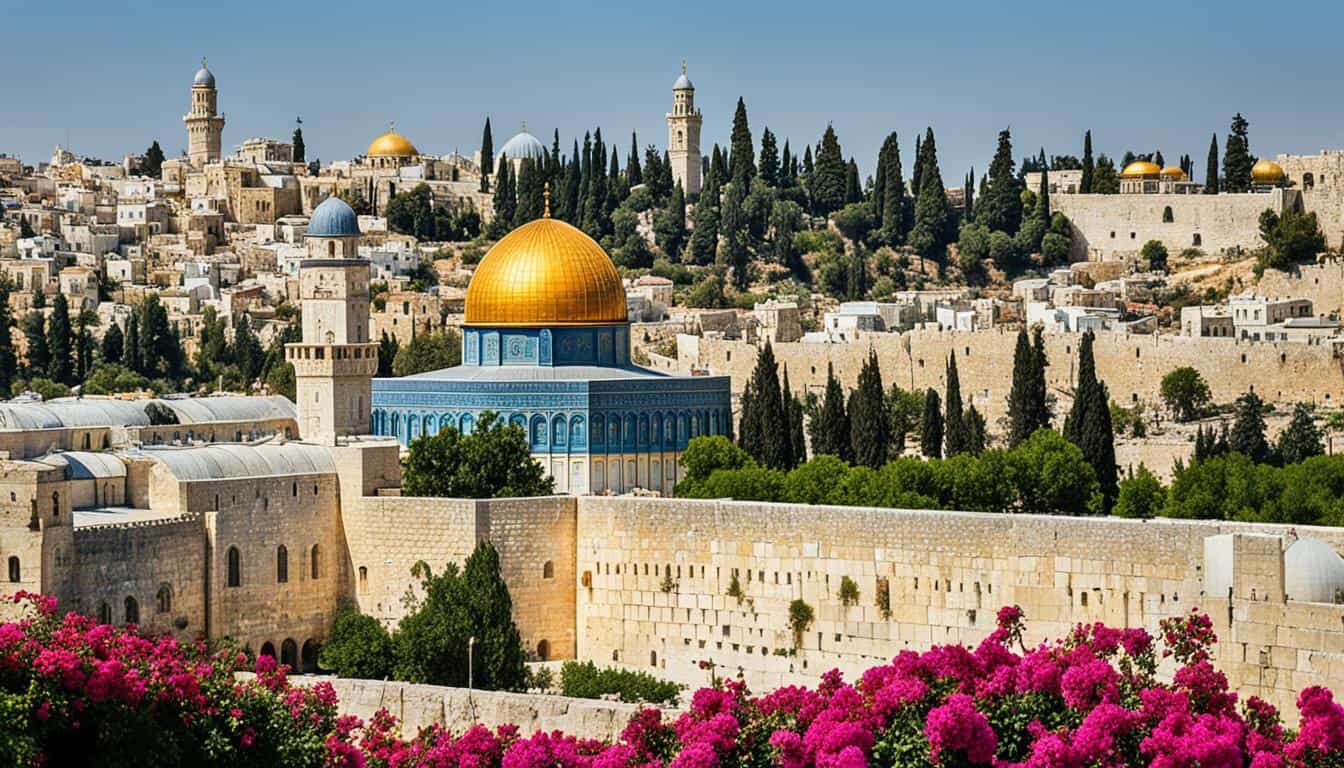Table of Contents
Throughout history, Jerusalem has fascinated many. But why is it so important across different religions?
Let’s journey through Jerusalem’s rich religious past. We’ll look at its impact on various faiths like Judaism, Christianity, Islam, and more.
Find out how Jerusalem connects, symbolizes, and foretells as a sacred place for all. Ready to explore Zion’s echoes?
Jerusalem in Jewish Tradition: The City of David and Solomon
Jerusalem is deeply important in Jewish tradition, honored as David and Solomon’s city. This city’s history and biblical role are central in Judaism. Jerusalem, from its days as Israel’s capital to its status today, symbolizes religious and cultural depth.
Jerusalem is the city chosen by God in the Bible. King David made it Israel’s capital. His son, Solomon, built the First Temple there, Israel’s worship core.
This city’s value comes from both its history and spiritual nature. Many believe Jerusalem is where heaven and earth connect, where God’s presence is strongest. It’s been a pilgrimage and worship center for Jews, with the Western Wall as a prayer site.
Jerusalem’s importance isn’t just spiritual; it’s also political and cultural for Jews. It symbolizes unity and hope, even in exile times. Jerusalem is central in Passover, Yom Kippur, Sukkot, and daily prayers.
The influence of Jerusalem goes beyond its physical space. It embodies the Jewish link to their homeland and their dreams of peace and prosperity.
As we look at Jerusalem’s role in different faiths, we see its significance in Judaism. The city’s history mirrors Jewish hopes for the Messiah.
How Does Jerusalem Symbolize God’s Presence in Judaism?
Jerusalem stands as a symbol of God’s presence in Judaism, rich in history and spirituality. It has been central to Jewish worship for thousands of years.
Jerusalem’s sacred status is highlighted by religious rituals. Jews journey there during Passover, Shavuot, and Sukkot festivals. These pilgrimages are times for spiritual renewal and divine connection.
“And it shall come to pass, that every one that is left of all the nations which came against Jerusalem shall even go up from year to year to worship the King, the Lord of hosts, and to keep the feast of tabernacles.” – Zechariah 14:16
The Holy Temple in Jerusalem was seen as God’s earthly home. It was where Jews came to worship and connect with the divine. Even without the Temple today, its significance and spiritual meaning remain strong.
Jews have always deeply connected to Jerusalem as their faith’s heart. The city mirrors the collective hopes and dreams of the Jewish people.
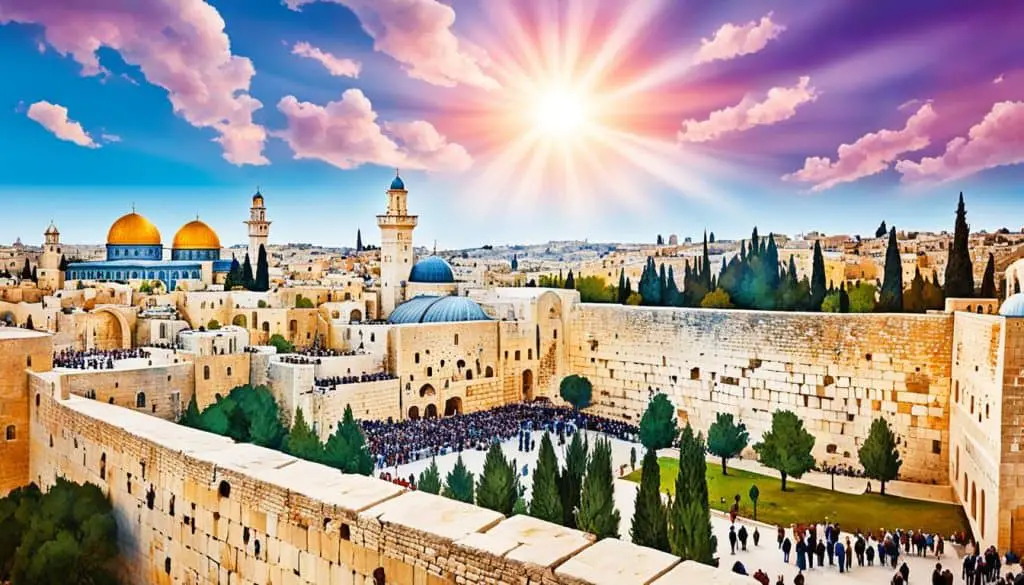
In What Ways Does the City’s History Reflect the Jewish Hope for the Messiah?
When we explore Jerusalem’s history, we see its strong link to the Jewish hope for the Messiah. This city has experienced many key events that show its importance in Jewish beliefs about the Messiah.
Jerusalem has been special to the Jewish people since King David and King Solomon’s time. The First and Second Temples, which stood here, were symbols of God’s presence. They were centers for worship and spiritual focus.
The Second Temple’s destruction in 70 CE was a turning point. This event caused great loss but also made people look forward to the Messiah’s coming. For centuries, Jews have kept alive the hope that the Messiah will come. They often view Jerusalem as the place where this savior will arrive to bring peace and spiritual renewal.
“Rejoice greatly, O daughter of Zion; shout, O daughter of Jerusalem: behold, thy King cometh unto thee: he is just, and having salvation; lowly, and riding upon an ass, and upon a colt the foal of an ass.” – Zechariah 9:9
Jewish prayers, rituals, and events like Passover highlight the hope for the Messiah’s arrival. Jerusalem’s history shows this continuous expectation. Various groups have tried to shape the city into their vision of a messianic-era Jerusalem.
The return of Jewish people from abroad and the creation of Israel in 1948 boosted this belief. When Jerusalem was reunited in 1967, it became even more a symbol of Jewish hope and independence.
Looking at Jerusalem’s history helps us understand how the hope for the Messiah has influenced its growth. It reminds us how central Jerusalem is to Jewish identity, faith, and dreams.
Key Points:
- Jerusalem’s historical and biblical significance aligns with the Jewish hope for the Messiah.
- The destruction of the Second Temple intensified the yearning for the Messiah’s arrival.
- Prayers, rituals, and celebrations emphasize the expectation of the Messiah’s eventual coming.
- Jerusalem’s ongoing development reflects the messianic aspirations of various religious and political movements.
- The establishment of the modern State of Israel and Jerusalem’s reunification further solidify the hope for messianic fulfillment.
Christianity’s New Jerusalem: From Prophecy to Fulfillment
In Christian faith, Jerusalem is more than just a city. It has deep roots in the Old Testament prophecies and touches the heart of Jesus Christ’s work on earth. All these connections point to the idea of a New Jerusalem.
The Old Testament hints at a heavenly city, made not by humans but by God. Jesus also pointed to Jerusalem as a key to understanding God’s plan. It was where His prophecy would come true.
“Jerusalem, Jerusalem, you who kill the prophets and stone those sent to you, how often I have longed to gather your children together, as a hen gathers her chicks under her wings, and you were not willing.” – Matthew 23:37
Jesus showed that Jerusalem was where God’s plan for salvation would unfold. Important events like the Last Supper and his crucifixion happened there. They were key to offering forgiveness to everyone.
“And when they had come to the place called Calvary, there they crucified Him” – Luke 23:33
But Jesus’ story didn’t end with His death. His resurrection was a key moment. It showed that death and sin could be overcome. This event laid the groundwork for the New Jerusalem, a place of hope for all who believe.
The idea of the New Jerusalem is still crucial for Christians. It shows a vision of a city where God is with his people. More than just a place, it’s a new way of being, focused on fixing and renewing everything.
The Implications for Believers Today
For Christians, the New Jerusalem means hope and a promise. It’s a picture of a future filled with goodness, without pain or evil.
This concept pushes believers to act, to make God’s kingdom real on Earth. It encourages living like Jesus did, with kindness, fairness, and caring for others.
By holding on to this promise, Christians change not just themselves but the world. They create communities that mirror God’s plans of togetherness, variety, and plenty.
| Benefits of the New Jerusalem for Believers | Scriptural References |
|---|---|
| Hope for eternal life and the restoration of all things | Revelation 21:4, 2 Peter 3:13 |
| Assurance of God’s presence and dwelling with humanity | Revelation 21:3 |
| A vision of a just and righteous kingdom of peace | Isaiah 60:18, Isaiah 65:25 |
| Opportunity to participate in God’s redemptive mission | Matthew 28:19-20, 2 Corinthians 5:18-20 |
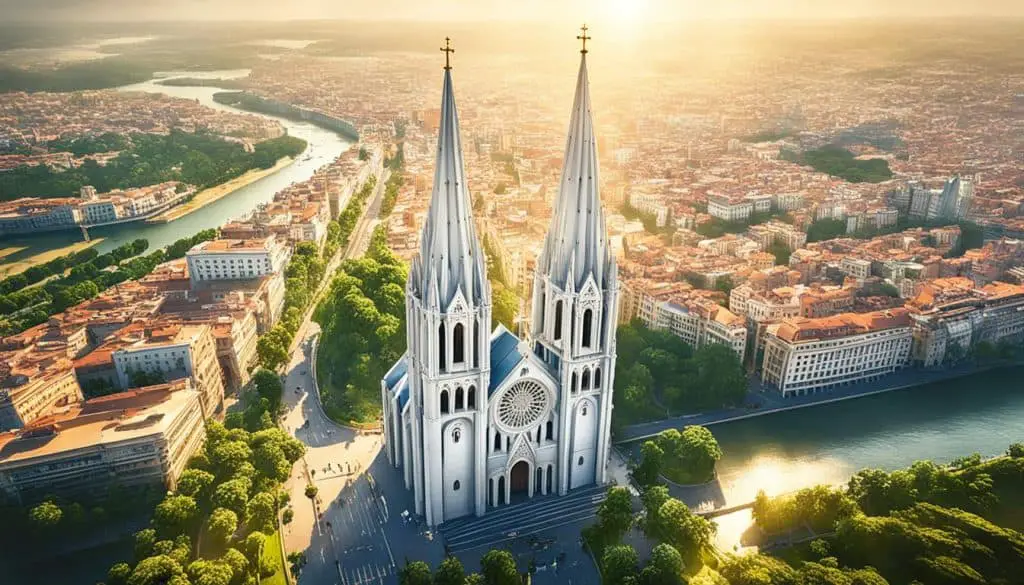
As believers face life’s challenges, the New Jerusalem is a beacon of hope. It guides and strengthens them. It inspires Christians to care deeply, live by God’s values, and look forward to the day God’s plans are fully realized.
How is Jerusalem Pivotal in the Life and Ministry of Jesus Christ?
Jerusalem is key in the story of Jesus Christ. This city saw major events that shaped Christianity. Here, Jesus had his Last Supper with his friends before he was crucified. At this meal, Jesus started the tradition of communion.
Also, Jerusalem was where Jesus made the ultimate sacrifice for us. He was crucified on Golgotha hill. This act is central in Christian faith. It shows God’s love and how he gave up his life for our sins.
In Jerusalem, Jesus rose from the dead, showing he is stronger than death. This miracle is why Jerusalem is so important to Christians. It brings hope and faith, reminding us of life after death.
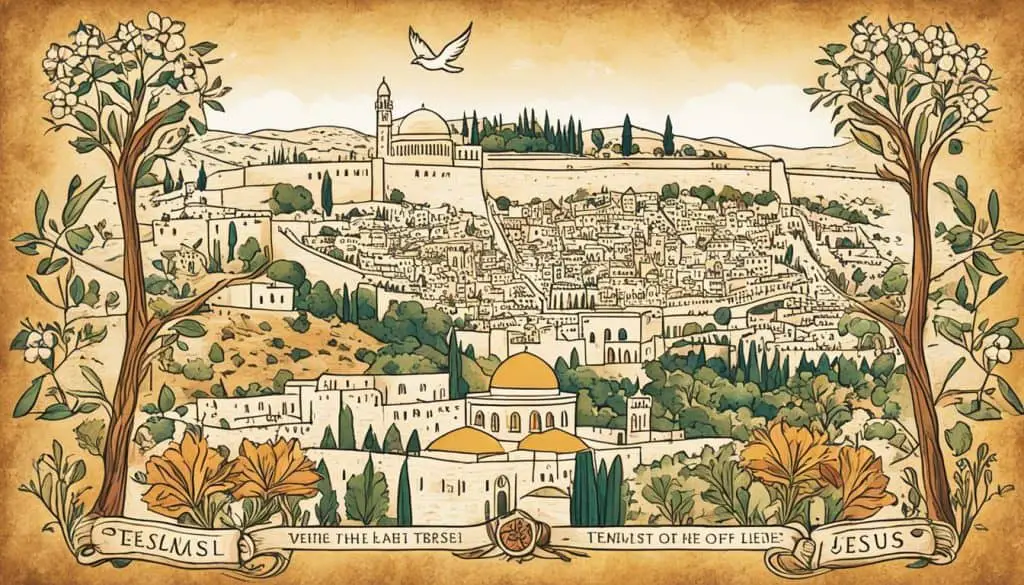
Jerusalem means a lot for Jesus’ story and Christian teaching. It’s not just where key events happened. It also has deep spiritual meaning. Jerusalem shows the heart of Christian beliefs.
What Does the New Jerusalem Signify for Christians Today?
Are you curious about what the New Jerusalem means for your faith? It has deep meaning for Christians today, touching on both faith and the future. This idea shapes your hope and understanding of God’s ultimate plan.
The New Jerusalem comes up in the Book of Revelation as a beautiful city from heaven. It’s the peak of God’s work and His promises to us. For believers, it’s a vision of a perfect life with God, free from any pain or evil.
This concept gives Christians hope for an eternal future with God. It reminds you this world isn’t your final home. A wonderful future awaits you with your Creator.
The New Jerusalem is about God’s salvation plan and His wish to fix everything. It shows a world filled with righteousness and peace. This vision encourages you to live a good life today, knowing it matters forever.
“But as it is written, Eye hath not seen, nor ear heard, neither have entered into the heart of man, the things which God hath prepared for them that love him.” – 1 Corinthians 2:9 KJV
The New Jerusalem makes Christians think about their role as Christ’s ambassadors. It urges you to live by God’s good values. By being like Jesus, you help make the New Jerusalem real here and now.
“And the nations of them which are saved shall walk in the light of it: and the kings of the earth do bring their glory and honour into it.” – Revelation 21:24 KJV
In the New Jerusalem, Christians find strength to keep going through tough times. It shines as a beacon of hope. Despite difficulties, believe in God’s plan of salvation.
“And God shall wipe away all tears from their eyes; and there shall be no more death, neither sorrow, nor crying, neither shall there be any more pain: for the former things are passed away.” – Revelation 21:4 KJV
The New Jerusalem isn’t just a far-off dream. It affects how you live now. It inspires you to seek fairness, peace, and work for a better world. It calls for a life of meaning, being good, and helping others, as part of God’s big plan.
“Nevertheless we, according to his promise, look for new heavens and a new earth, wherein dwelleth righteousness.” – 2 Peter 3:13 KJV
Let the New Jerusalem encourage you as you face life’s ups and downs. Embrace God’s love and His promise of a wonderful future. Stay true to the belief that the New Jerusalem is God’s redemption fulfilled. Live reflecting this truth.
| Symbolic Meanings of the New Jerusalem for Christians Today |
|---|
| The fulfillment of God’s promises |
| A future of eternal communion with God |
| Hope for a renewed and perfected existence |
| Living faithfully and uprightly in the present |
| Embodiment of God’s principles and values |
| Endurance through trials and challenges |
| Solace and strength in times of difficulty |
| Inspiration to seek justice and promote peace |
| A life of purpose, holiness, and service |
| Anticipation of the coming kingdom |
Jerusalem in Islamic Eschatology: A Site of Sacred History
Jerusalem is very important in Islamic eschatology, linking closely with Prophet Muhammad’s life and teachings. Muslims around the world feel its spiritual significance.
The Al-Aqsa Mosque, at Jerusalem’s heart, is among Islam’s holiest sites. Prophet Muhammad is said to have ascended to heaven here during the Night Journey. This event ties Jerusalem closely to divine revelation, highlighting its sacred role in Islam.
The Dome of the Rock, with its golden dome, is another key landmark. It marks where Prophet Muhammad began his heavenly ascent. Its history and architecture symbolize Islam’s deep connection with the city.
Jerusalem is crucial in Islamic end-time beliefs. It’s seen as where significant events of the end times will occur. The city connects the earthly with the divine, rooted in deep historical and spiritual links.
End-time prophecies about Jerusalem are key in Islamic beliefs. Muslims think it will host the final judgment, bringing justice and peace. This will happen under the Mahdi and Jesus’s return, signaling the end times.
Muslims from everywhere come to Jerusalem for pilgrimage. They come to feel closer to its sacred history, strengthen their faith, and seek enlightenment.
Jerusalem’s role in Islamic eschatology brings hope and deeper faith to Muslims. The city is a symbol of Islam’s spiritual, cultural, and religious heritage.
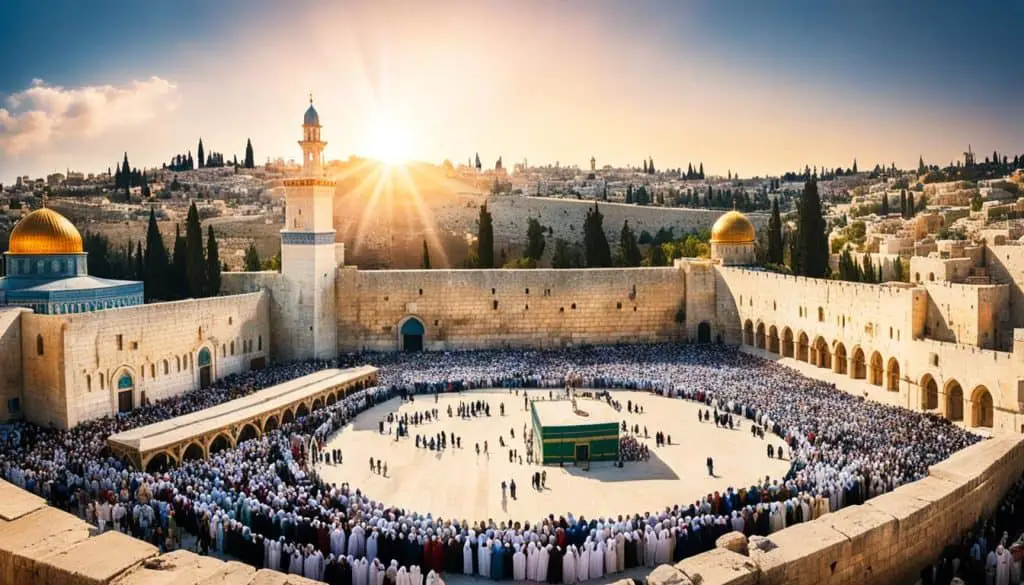
How Does Jerusalem Serve as a Bridge Between the Earthly and the Divine in Islam?
Jerusalem is very important in Islam, acting as a bridge to the heavenly world. Its meaning comes from when Prophet Muhammad went from the Al-Aqsa Mosque up to the heavens. There, he got Allah’s commands.
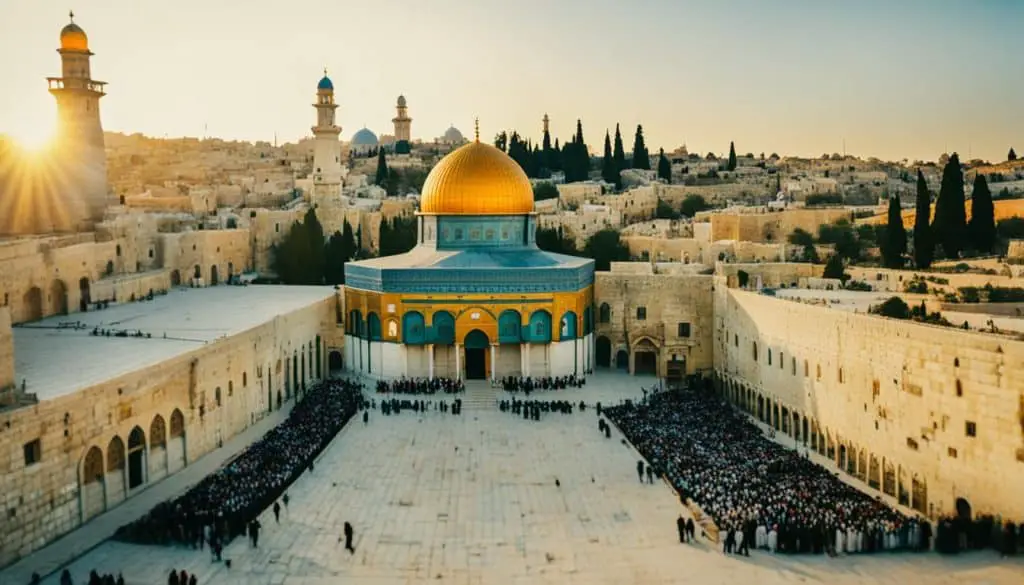
This amazing journey, called Isra and Mi’raj, links Jerusalem to the skies. It symbolizes the Prophet’s deep spiritual moment and God’s messages. The Al-Aqsa Mosque and the Dome of the Rock are sacred because of this event.
“Exalted is He who took His Servant by night from al-Masjid al-Haram to al-Masjid al-Aqsa, whose surroundings We have blessed, to show him of Our signs. Indeed, He is the Hearing, the Seeing.” (Quran 17:1)
Jerusalem’s role in Islam is highlighted through traditions and architecture. Muslims visit it for devotion and to find spiritual guidance. Praying at the Al-Aqsa Mosque is seen as very rewarding, linking people with God.
The Unity of Creation and Worship
In Islamic views, Jerusalem unites Muslims with others. It is holy to Jews and Christians too, showing peace among faiths.
This bond with Jerusalem helps Muslims respect other religions. It shows we are all one in our devotion to God.
Looking Towards the Future
Islamic traditions stress Jerusalem’s role in the future. It is seen as key for justice and peace on the Day of Judgment. There, everyone will face their actions.
| Key Beliefs | Jerusalem in Islam |
|---|---|
| Ascension of the Prophet Muhammad | The Al-Aqsa Mosque symbolizes the place from which the Prophet ascended to the heavens during the Night Journey. |
| Shared Heritage | Jerusalem unifies Muslims and other Abrahamic faiths, emphasizing the importance of interfaith understanding and cooperation. |
| End-Time Significance | Jerusalem is believed to be a center of justice and peace on the Day of Judgment, epitomizing the divine rule for all humanity. |
Jerusalem’s spiritual meaning as a bridge for Muslims stays strong. It’s seen as a symbol of faith, unity, and a deep connection with the divine in Islam.
In What Ways Do Islamic Traditions Highlight Jerusalem’s End-Time Significance?
In Islamic traditions, Jerusalem is very important for the end times. It has a big role in Muslim beliefs about the future.
One key idea is the Day of Judgment. This is when everyone is judged for their lives’ actions. Muslims believe Jerusalem will be where Prophet Muhammad gathers humanity for Allah’s final judgment.
Jerusalem is also seen as a future place of peace and fairness. It’s thought to be where people of all backgrounds will unite.
The city is important in Islam for another big reason. This is where Prophet Muhammad had a miraculous journey. It’s called the Isra and Mi’raj, linking heaven and earth.
“Glory be to Allah Who did take His servant for a journey by night from the Sacred Mosque to the Farthest Mosque.” – Qur’an 17:1
Important Islamic sites like the Al-Aqsa Mosque and the Dome of the Rock are in Jerusalem. Their presence makes the city very sacred to Muslims.
Islamic traditions really highlight Jerusalem’s key role in the end times. They show its importance to the final judgment, its future as a peace center, and its link to sacred events.
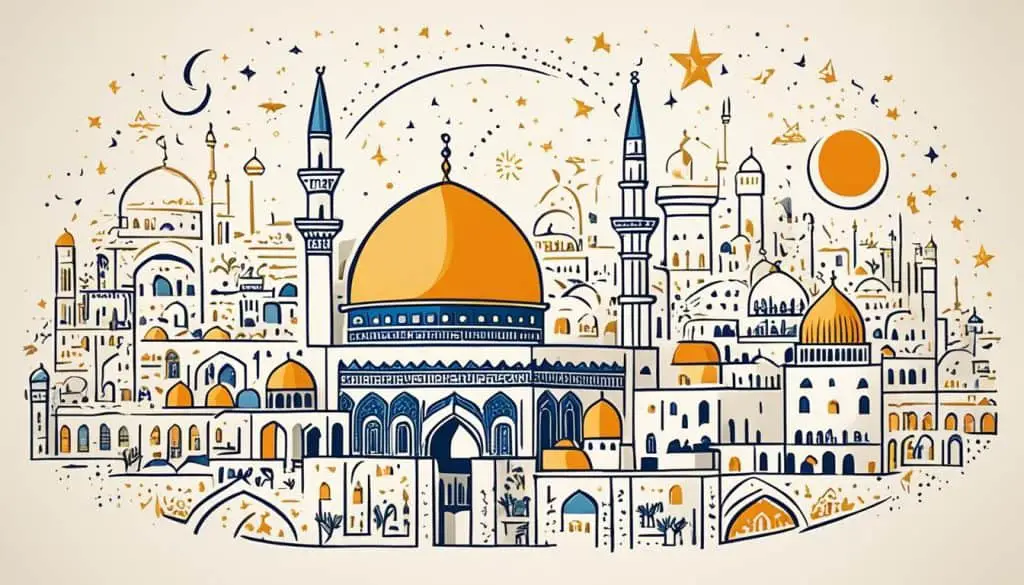
Baha’i Faith: Mount Carmel and the New Jerusalem
The Baha’i Faith offers a special outlook on Jerusalem. It highlights the importance of Mount Carmel and the idea of the New Jerusalem. Jerusalem symbolizes a spiritual place of unity and harmony in Baha’i writings.
Mount Carmel is in Haifa, Israel, and is very important to Baha’is. It is a sacred place and the Baha’i Faith’s global and spiritual hub. Having the Baha’i World Centre in Israel shows the New Jerusalem idea is real in the Baha’i view.
The Baha’i Faith says the New Jerusalem is a spiritual city. It’s where people from all over can live in peace and equality. This city signifies human unity and God’s ultimate plan for the world. Baha’is hope to help make the New Jerusalem real through prayer, service, and meditation.
The Baha’i Faith focuses on global ideals. It dreams of a world where all religions work as one for humanity’s good. Baha’i teachings encourage people to grow spiritually. They motivate folks to help build a world based on justice, peace, and unity.

